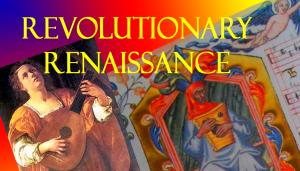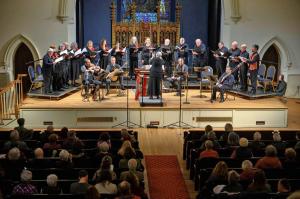Award Winning Ensemble to Perform Two Concerts with Compositions of Musical Minorities of the Renaissance in the Berkshires
Women generally were not considered apt to hold a profession as a musical leader in performance and composition. I feel strongly about bringing the works of these women to our audiences.”
LAKEVILLE, CT, UNITED STATES, February 7, 2025 /EINPresswire.com/ -- Crescendo, the award-winning music program based in Lakeville, CT, presents two concerts with rarely performed works by composers of two minority groups of the Renaissance era. The repertoire includes vocal and instrumental works by six female Italian composers: Isabella de' Medici, Maddalena Casulana, Paola Massarenghi, Lucia Quinciani, Raffaella Aleotti, and Claudia Francesca Rusca, and motets and a madrigal by the Afro-Portuguese Renaissance composer Vicente Lusitano. Crescendo Vocal Ensemble of twenty-five singers, with soloists Jennifer Tyo and Sarah Fay, sopranos, Laura Evans, alto, and Igor Ferreira, tenor, are accompanied by Christa Patton, harp and recorder, and Juan Mesa, organ. The ensemble is directed by Crescendo’s founding artistic director, Christine Gevert.— Christine Gevert, founding artistic director of Crescendo
Female composers of the 16th century are a mystery, as we know very little about them. Crescendo’s founding artistic director, Christine Gevert, notes: “They were revolutionary, because women generally were not considered apt to hold a profession as a musical leader in performance and composition. I feel strongly about bringing the works of these women to our audiences. Not only because they are a rarity but also to show some compositions that are absolutely spectacular that we have been missing out on for far too long.
During the last fifty years, there has been a movement towards a more inclusive scholarship, one focused also on discovering the achievements of women and other minorities in music. This has not yet succeeded in uncovering the breadth and depth of women's musical experience in earlier times. It has been a belief since the 19th century that during the Renaissance (and Medieval times) there were no female professional musicians, the women who did perform were only amateurs, and the very few female composers who did exist had little or no influence or standing among the musicians of rank.”
The six female composers featured in this program are: Isabella de' Medici, a noble woman from the powerful Medici family in Florence, Italy and a talented singer and lutenist, who was also a patron of the arts, hosting musical events and seeking out many female poets and singing groups for her performances; Maddalena Casulana, the first woman in Western music history to publish her music and consider herself a professional composer; Paola Massarenghi from Parma, who is credited for being the second woman ever to have a madrigal published during her lifetime; Venetian Lucia Quinciani, the earliest known published female composer of monody; Raffaella Aleotti, a nun whose compositions were the first book of sacred music by a woman to appear in print, and who not only performed, but led an ensemble of twenty-three nuns – something not usual in her times; and Claudia Francesca Rusca, who wrote the first known preserved instrumental works by a woman.
The Portuguese composer and music theorist Vicente Lusitano was the only published composer of African descent in 16th century Europe. His highly elaborate vocal music has only become more widely available since 2022, following a shift in attention to discover and perform more music by Black composers. “Rehearsing his vocal works for up to eight voices has been a gift and a challenge!” remarks Ms. Gevert. “The quality of Lusitano’s works is at the level of one of the greatest early masters of vocal polyphony, Josquin des Prez, whom he admired and on whose famous motet based on the Marian plainchant sequence “Inviolata, integra et casta” he based his own. Lusitano expands des Prez’ motet in the number of voices, from five to eight, and intensifies the harmonic richness and dissonance, creating a true masterwork. This motet, for me, stands out among any repertoire of the 16th century as a multi-dimensional listening experience that creates a richer soundscape, transporting us as listeners to a mental state that we don’t often access.”
The concerts will take place on Saturday, March 1, at 4:00 pm at Trinity Church, Lakeville, CT, and on Sunday, March 2, at 4:00 pm at Saint James Place, Great Barrington, MA. Tickets are available online at www.crescendomusic.org, or on a first-come-first-served basis at the door, 45 minutes prior to the concert.
Support for these concerts has been provided to Crescendo by the Connecticut State Department of Economic and Community Development/Connecticut Office of the Arts (COA) from the Connecticut State Legislature. We also thank NBT Bank and WMNR Fine Arts Radio for their support.
Christine Gevert
Crescendo
crescendo@crescendomusic.org
Legal Disclaimer:
EIN Presswire provides this news content "as is" without warranty of any kind. We do not accept any responsibility or liability for the accuracy, content, images, videos, licenses, completeness, legality, or reliability of the information contained in this article. If you have any complaints or copyright issues related to this article, kindly contact the author above.




